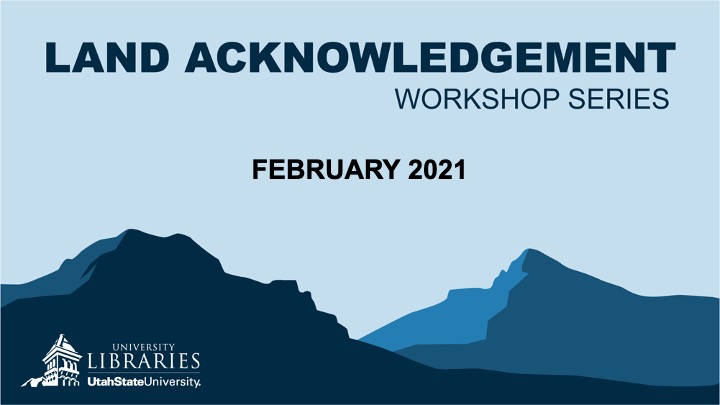
USU Libraries Land Acknowledgement Workshop Series
-

USU Libraries Land Acknowledgement Workshop Part 2
Dean McGuire, Clint Pumphrey, and Nick Gittins
Two guest speakers shared their thoughts on considerations for scholars examining questions related to land and working with materials of or describing indigenous peoples.
Dean McGuire, Graduate student, USU History Department
"A Sincere Middle Ground: Collaborative Research between Native Communities and Scholars
What does “collaboration” mean for Native people and academia? What do scholars have to gain from working with Native people in the present to learn about the past, and much more importantly, what do Native people and communities today have to gain from working with educational institution such as universities? In 2018, a number of scholars who associate with Native American and Indigenous Studies (NAIS) participated in a roundtable where they discussed various methods and principals for Native history. Among these principles is a commitment to engage with Native people about their own past, but the approaches and purpose for collaborative research is still debated by scholars. American Historical Review published an exchange in spring 2020, “Historians and Native American and Ingenuous Studies,” which was prompted by David J. Silverman’s earlier review of two books, Lisa Brooks’s Our Beloved Kin: A New History of King Phillip’s War and Christine M. DeLucia’s Memory Lands: King Phillip’s War and the Place of Violence in the Northeast. In his review, Silverman argued that Brooks’s and DeLucia’s collaborative research with Native people in the present led to a number of misinterpretations about the past (King Phillip’s War). That review set up a much larger and heated discussion about collaboration in the AHR Exchange. By looking at this exchange, we can better understand how collaborative research serves Native communities and academia.”
Clint Pumphrey, USU Manuscript Curator
" The Northwestern Band of Shoshone Nations Digital Archive is the product of a 20-year project to collect materials produced by tribal members and digitize relevant records found in archives across the state. In 2019, the members and friends of the tribe who compiled the archive approached librarians and archivists at USU’s Merrill-Cazier Library to make the archive accessible through the library’s website, a process which is currently underway. Manuscript curator Clint Pumphrey will discuss the history of the archive and what it contains, as well as important considerations for the ownership, description, and access to these materials.” -

USU Libraries Land Acknowledgement Workshop Part 1
Darren Parry, Marilyn Cuch, Colleen O'Neill, and Nick Gittins
Three guest speakers shared their thoughts on the value and purpose of land acknowledgements.
Darren Parry: Former Chairman of Northwestern Band of the Shoshone Nation
"As someone gains a greater understanding of the perspective of the people that first lived here, it not only becomes easier to acknowledge their contributions to history it becomes necessary. And by the way...we are still here."
Marilyn Cuch, Lecturer in the School of Teacher Education and Leadership at the Uintah Basin Campus, Hunkpapa Lakota from the Standing Rock Sioux Tribe of North and South Dakota
"Culturally relevant teaching entails teaching about the Indigenous peoples and the lands our schools, homes, and lives take place on. As an Indigenous educator and parent, I will focus on why it is important, where to start in developing a land acknowledgement statement, and providing context about presenting a land acknowledgement statement from an Indigenous perspective."
Dr. Colleen O’Neill, Associate Professor of History
“Reckoning with History: Land Grant Universities and Native American Land Acknowledgements
Land Grant Universities are often heralded as one of America’s greatest achievements, a testament to the success of American democratic institutions. In the years following the Civil War, these institutions provided liberal and technical education to more people than ever before. But, the expansion of democracy meant the denial of land and sovereignty rights to Native Americans. My talk will examine this contradiction, and discuss meaningful ways that Land Grant Institutions can acknowledge this history and better serve the Native communities on whose land they now stand."

